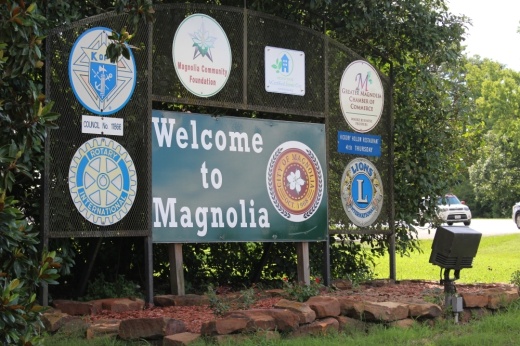Magnolia City Council members voted to accept an agreement Dec. 14 requiring the city to reclassify its water rate structure to group houses of worship with commercial businesses, said Jeremy Dys, special counsel for litigation and communications for First Liberty Institute—one of the law firms representing Magnolia churches. In return, local churches—Magnolia Bible Church, Magnolia’s First Baptist Church and Believers Fellowship—will dismiss their yearslong lawsuit against the city.
“Churches and nonprofits provide a multitude of services to their communities, particularly for the most vulnerable,” said Aaron Streett, partner at Baker Botts—the other firm representing the Magnolia churches—in a news release Dec. 16. “This joint agreement will allow both the city and all the religious organizations of Magnolia to build a stronger community.”
The lawsuit was first filed in May 2019, Community Impact Newspaper previously reported, claiming the city’s rate structure targeted churches with higher fees. An institutional water user category was rolled out for tax-exempt or nonprofit entities in April 2018, charging institutions a higher rate than commercial businesses. Prior to the 2018 change in rate structure, these institutions were charged the same as commercial businesses, Community Impact Newspaper reported.
For example, the city’s fee schedule—publicly accessible as of Dec. 17—shows a base water rate of $30 for commercial businesses with a charge of $7.50 per 1,000 gallons between 5,001 and 15,000 gallons used. For institutions, the base water rate is $52.50 with a charge of $9.75 per 1,000 gallons between 5,001 and 10,000 gallons used, city documents show.
City officials previously said in 2017 the higher institutional rate would allow the city to collect funds from these entities in place of taxes or other fees not assessed because the entities are tax-exempt, Community Impact Newspaper reported.
After the new rate structure took effect in 2018, church leaders said they saw water bills increase as much as 300% going from the commercial category to the institutional category.
The joint agreement council voted to accept Dec. 14 requires the city to group “all religious organizations, religious nonprofits, churches or houses of worship” with commercial businesses, according to a Dec. 16 news release from First Liberty and Baker Botts.
With lower water rates, Dys said he believes this frees up funds for local churches and organizations to better serve the community.
“It means that they can do what they do best—they can partner with the community, and that includes the city here, too, to improve the community,” he said.
Magnolia City Administrator Don Doering said in a phone interview Dec. 16 he anticipates council will vote on an item at the next City Council meeting Jan. 11 regarding the settlement, as litigation is pending.
“All I know right now is that we’re trying to settle with the churches,” Doering said. “We are hopeful that the settlement will be complete as soon as possible.”
Dys said the agreement states the city will vote whether to move religious organizations into a new rate class—grouping them with commercial businesses—at the January meeting. Then, the joint agreement will be filed with the court, which will then declare a final judgment, and within five days of the final judgement the churches will dismiss their portion of the lawsuit, Dys said.
“We are grateful that churches and all religious organizations in Magnolia will now be treated equally along with area businesses by the city of Magnolia,” said Steve Burrell, senior pastor of Magnolia Bible Church, in the release. “We are eager to work with the City Council to continue to improve the lives of our friends and neighbors.”
Dys said the move by the city to agree to settle the yearslong dispute sets a precedent for other cities nationwide.
“I think the city has set a good example now with this settlement that it’s important to treat churches equally with other organizations and not single them out for whatever purpose—and that’s all the churches have been after in this litigation, truly, is to just be treated fairly and equally,” he said. “In the very least, we ought to treat our churches on the same footing with other businesses. ... I think that will reverberate around the country, quite frankly, as the city has now set that example that it’s important to treat our [churches] fairly and equally with other businesses in the area.”





